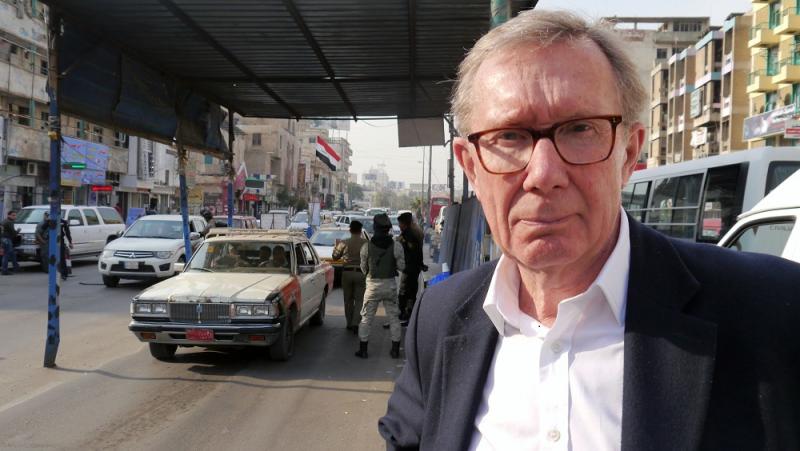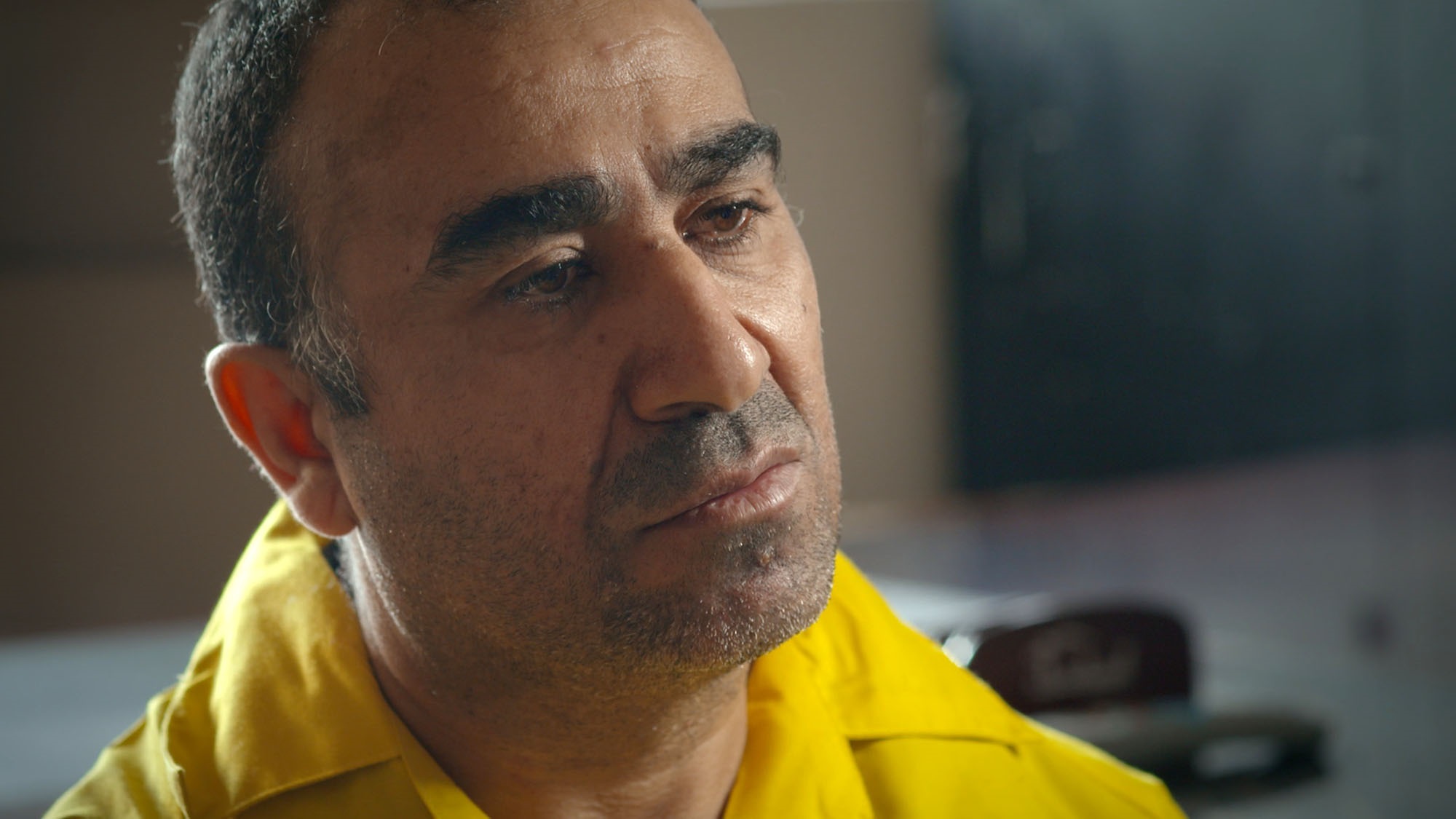This World: World’s Richest Terror Army, BBC Two | reviews, news & interviews
This World: World’s Richest Terror Army, BBC Two
This World: World’s Richest Terror Army, BBC Two
Untangling the structure of Islamic State reveals the scale of the enemy

You haven’t had to actually watch the brutal executions staged by Islamic State (IS, or ISIS or ISIL, as it’s also known) to register them: just a single image registered has been more than enough to horrify. Managing to penetrate the world’s consciousness to such an extent has surely been one of the terror group’s most singular achievements.
Presenter Peter Taylor (main picture) journeyed from the frontlines where the Kurdish peshmerga was exchanging fire with IS fighters just 200 meters away, to the corridors of Washington for a conversation with General David Petraeus, the one-time US commander in Iraq who was later briefly CIA director (he wasn’t the only interviewee here who was credited with rotating job titles). There was a sleek top politician in Istanbul exile and a firebrand cleric in Amman, both explaining the repercussions of the Sunni-Shia divide as it emerged in post-invasion Iraq to an audience that, we might suggest, is not exactly au fait with the key differences.
Islamic State farms out the plundering of archaeological sites to the private sector
But one encounter was stranger than most. Until his capture, Abu Hajjar (pictured, below right) had been IS’s effective treasurer, moving large sums of cash – in the sides of his car, in US dollars, of course – around Iraq, and here he was explaining how the organization collected its funds. The casualness of it all struck home: this was no interrogation – that had happened earlier, including torture, Hajjar dropped in matter-of-factly, and he’d been turned when the Iraqi secret services threatened his family. We were left guessing why Taylor had been given this access, and it must have been the most unusual interview of his career: he convinced the captors to reveal Hajjar’s face so that there was at least a chance of eye-contact, but taking off the handcuffs was a request too far.
Hajjar helped fill us in on IS’s revenue-collecting activity, some of which was quite well-known stuff. But the devil was exactly in the details: how those tempted to refuse its mafia-style extortion rackets were shown a grenade – that usually changed their minds. “Bank robbery” hardly seemed the right term given that when IS took Iraq’s second city Mosul, some half a billion dollars was theirs for the taking in the vaults.
 Earning a steady flow of income from oil had been made more complicated by targeted US bombing, but it still flourished in a complicated network that went from extractors, to refiners, to end-users. The latter, it was claimed, included the Assad regime that is nominally the Islamic State’s sworn enemy: “strange bedfellows” felt like a candidate for understatement of the year. Apparently oil is exchanged in return for electricity, which comes back through the power-lines from Syria (Damascus denied it, of course).
Earning a steady flow of income from oil had been made more complicated by targeted US bombing, but it still flourished in a complicated network that went from extractors, to refiners, to end-users. The latter, it was claimed, included the Assad regime that is nominally the Islamic State’s sworn enemy: “strange bedfellows” felt like a candidate for understatement of the year. Apparently oil is exchanged in return for electricity, which comes back through the power-lines from Syria (Damascus denied it, of course).
Rounding off this macabre budget list were kidnapping and antiquities, which demanded different degrees of hypocrisy from all sides. Britain and America steadfastly refuse to pay ransoms, receiving instead those gruesome execution images: France, it was suggested, did pay – a rumoured $18 million – and got four of its citizens back. Though IS very publicly documents its destruction of the relics of all past civilizations, smashing up monuments and museum collections in territory it's captured, it farms out the plundering of archaeological sites to the private sector. Would-be looters first have to obtain a permit, and then pay a 20% tax on their discoveries, which are duly spirited away across a border into the hands of clandestine overseas collectors.
It was the sheer particularity of that process – that a terrorist organization effectively has in-house art experts to value its booty – that sets IS apart. It raised the key question of all: to what extent does the organization really resemble a state, fulfilling the needs of citizens in a primitive, however brutal sort of social contract? We saw how the organization had evolved in the American detention camps that brought together its current key players in one place, giving them plenty of free time to plan for the future. But we can only guess whether this force – “bin Ladenism on steroids” was the most striking epithet used here – will endure, or implode. The American talking heads here suggested the latter, but even that was hardly comforting given that such an outcome could mean the dispersal of some 12,000 foreign fanatics to wreak havoc in other parts of the world.
This was the third in an exceptional This World trio of programmes, following on from Britain's Jihadi Brides and Kill the Christians which, while no less striking, focused rather more on individuals. World’s Richest Terror Army took a broader oversight, but it certainly wasn’t any more encouraging. “The future is going to be very dark,” were the final words we heard.
rating
Explore topics
Share this article
more TV
 Baby Reindeer, Netflix review - a misery memoir disturbingly presented
Richard Gadd's double traumas are a difficult watch but ultimately inspiring
Baby Reindeer, Netflix review - a misery memoir disturbingly presented
Richard Gadd's double traumas are a difficult watch but ultimately inspiring
 Anthracite, Netflix review - murderous mysteries in the French Alps
Who can unravel the ghastly secrets of the town of Lévionna?
Anthracite, Netflix review - murderous mysteries in the French Alps
Who can unravel the ghastly secrets of the town of Lévionna?
 Ripley, Netflix review - Highsmith's horribly fascinating sociopath adrift in a sea of noir
Its black and white cinematography is striking, but eventually wearying
Ripley, Netflix review - Highsmith's horribly fascinating sociopath adrift in a sea of noir
Its black and white cinematography is striking, but eventually wearying
 Scoop, Netflix review - revisiting a Right Royal nightmare
Gripping dramatisation of Newsnight's fateful Prince Andrew interview
Scoop, Netflix review - revisiting a Right Royal nightmare
Gripping dramatisation of Newsnight's fateful Prince Andrew interview
 RuPaul’s Drag Race UK vs the World Season 2, BBC Three review - fun, friendship and big talents
Worthy and lovable winners (no spoilers) as the best stay the course
RuPaul’s Drag Race UK vs the World Season 2, BBC Three review - fun, friendship and big talents
Worthy and lovable winners (no spoilers) as the best stay the course
 This Town, BBC One review - lurid melodrama in Eighties Brummieland
Steven Knight revisits his Midlands roots, with implausible consequences
This Town, BBC One review - lurid melodrama in Eighties Brummieland
Steven Knight revisits his Midlands roots, with implausible consequences
 Passenger, ITV review - who are they trying to kid?
Andrew Buchan's screenwriting debut leads us nowhere
Passenger, ITV review - who are they trying to kid?
Andrew Buchan's screenwriting debut leads us nowhere
 3 Body Problem, Netflix review - life, the universe and everything (and a bit more)
Mind-blowing adaptation of Liu Cixin's novel from the makers of 'Game of Thrones'
3 Body Problem, Netflix review - life, the universe and everything (and a bit more)
Mind-blowing adaptation of Liu Cixin's novel from the makers of 'Game of Thrones'
 Manhunt, Apple TV+ review - all the President's men
Tobias Menzies and Anthony Boyle go head to head in historical crime drama
Manhunt, Apple TV+ review - all the President's men
Tobias Menzies and Anthony Boyle go head to head in historical crime drama
 The Gentlemen, Netflix review - Guy Ritchie's further adventures in Geezerworld
Riotous assembly of toffs, gangsters, travellers, rogues and misfits
The Gentlemen, Netflix review - Guy Ritchie's further adventures in Geezerworld
Riotous assembly of toffs, gangsters, travellers, rogues and misfits
 Oscars 2024: politics aplenty but few surprises as 'Oppenheimer' dominates
Christopher Nolan biopic wins big in a ceremony defined by a pink-clad Ryan Gosling and Donald Trump seeing red
Oscars 2024: politics aplenty but few surprises as 'Oppenheimer' dominates
Christopher Nolan biopic wins big in a ceremony defined by a pink-clad Ryan Gosling and Donald Trump seeing red
 Prisoner, BBC Four review - jailhouse rocked by drugs, violence and racism
Sofie Gråbøl joins a powerful cast in bruising Danish drama
Prisoner, BBC Four review - jailhouse rocked by drugs, violence and racism
Sofie Gråbøl joins a powerful cast in bruising Danish drama

Add comment